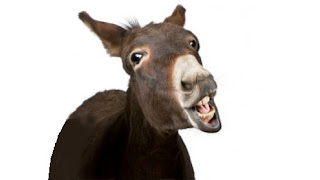The mule is the offspring of a male donkey
(jackass) and a female horse (mare). The opposite
cross-a female donkey (jenny) bred to a male
horse (stallion)-produces a hinny. A mule has a
donkey's large head and long ears, the body of a
horse, and an asslike tail. Its voice is a bray that is
somewhat different than that of the
ass. Some mules are quite large: as
much as sixteen hands (sixty-four
inches) at the withers.
Mules are strong and durable.
They are more surefooted and can
bear heavier loads than either the
horse or the donkey. This is a good example
of hybrid vigor or heterosis: the
tendency of hybrids to be larger and
more durable than their parent species.
It is often said that a mule is
smarter than a horse because a horse
may overeat and "lounder" (become
ill fromovereating) if given unlimited
access to grain, but a mule will not.
Mules are almost always infertile, apparently
due to differing numbers of
chromosomes in the gametes of the
horse and the donkey.
Mules in History
Mules were essential in
transport for at least three thousand
years, from ancient times until the invention
of the steam engine and the building of
railroads. Mules can be ridden but were used
mostly in mule teams or mule trains to pull
wheeled vehicles in both peace and war. For example,
the twenty-mule teams of Death Valley,
California, hauled two wagons loaded with borax
plus a water wagon with a combined weight of
over twenty-seven tons.
Wild populations of equids have been greatly
reduced by humans through hunting and habitat
destruction, some to the point of extinction. Domestic
horses, donkeys, and mules, however,
have thrived for thousands of years in association
with humankind. Despite being largely replaced
by mechanical power, domestic equids are still
common.


No comments:
Post a Comment